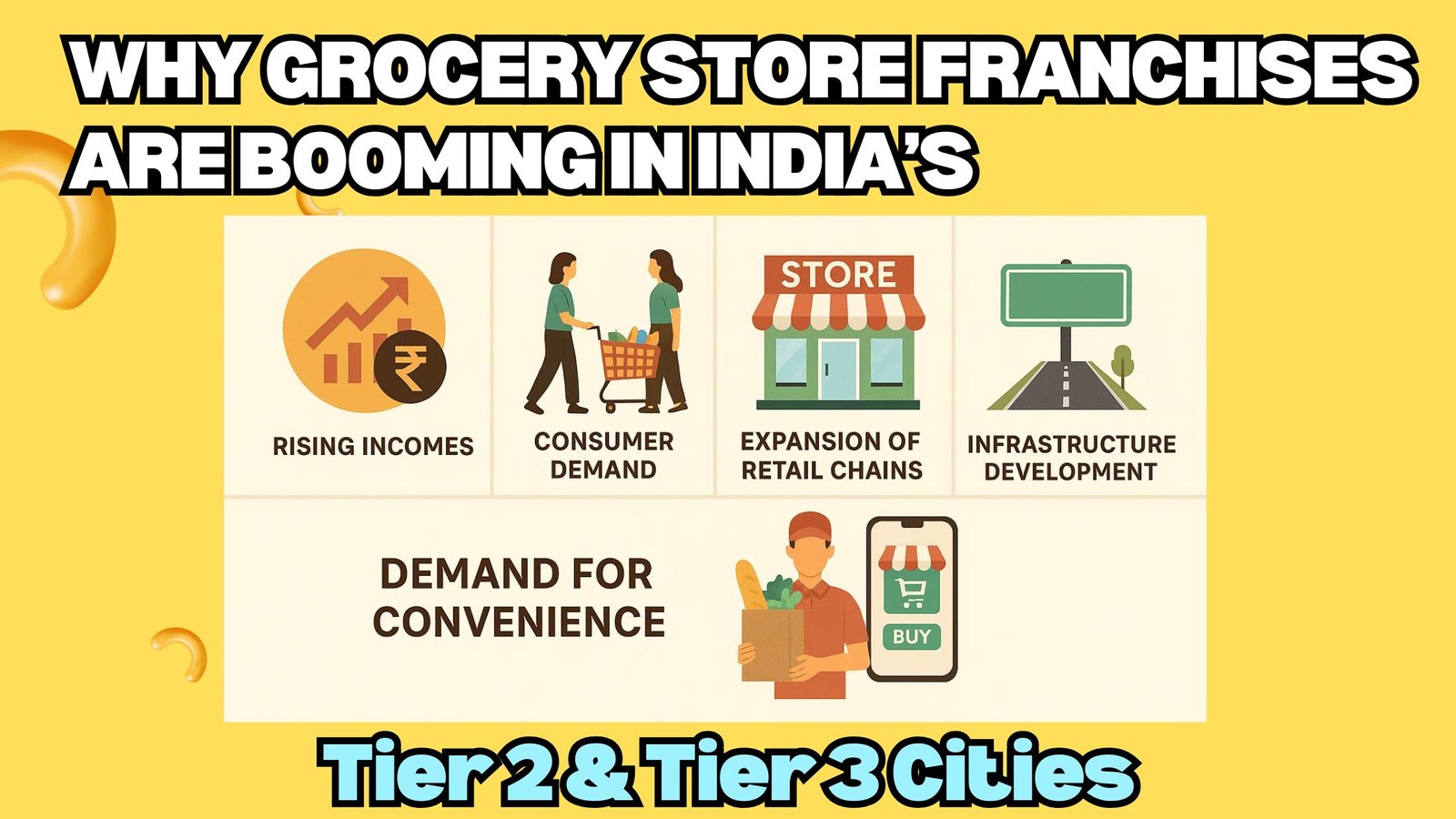In India, the grocery retail industry is undergoing a dramatic transformation. Grocery Stores Franchises in India have shifted their focus from metropolises to smaller towns and cities. This shift in strategy represents one of today’s most important business opportunities.
Organized retail is experiencing a boom, especially in Tier 2 and Tier 3 Indian cities. Entrepreneurs are finding that markets from Coimbatore up to Kanpur offer unique benefits that make these ideal locations for franchising.
The rising disposable income fuels demand
Indian grocery store franchises thrive in smaller towns because families can afford to buy quality goods. Economic growth has led to a rise in the middle class, who value convenience and brand goods.
Contrary to metropolises where the income growth plateaued in recent years, cities of Tier 2 or Tier 3 have consistently increased salaries across all sectors. This economic boom is a result of government jobs, emerging industries, and small businesses. Organized grocery stores are popular among families earning Rs 2-6 lakhs per year.
Franchise owners will benefit directly from this growing buying power. These cities are known for their large-scale purchases, which lead to higher average sales values than urban markets.
Low Real Estate costs mean higher profits
Affordable commercial space is one of the greatest advantages for franchises operating in India’s smaller cities. A 1000 square foot store in Mumbai may cost between Rs 2 and 3 lakhs per year approx, but the same area in smaller cities such as Nashik or Salem is only Rs 30 to 50 thousand approx.
Franchise owners can benefit from a dramatic reduction in their rental costs.
- Profit margins are maintained
- Spend more on inventory and the customer experience
- Get your initial investment back faster
- Expansion to other locations in the same city
The smart entrepreneurs take advantage of this by purchasing prime locations for a fraction of the cost in metro cities. Successful franchisees started with just one outlet and have now expanded to 3-4 in the same town.
Reduced competition, more market share
Grocery chains saturate the metro cities. It isn’t easy to get established in these areas. Franchises for grocery stores in India are not as competitive in Tier 2 or Tier 3 cities.
In most smaller towns, traditional weekly markets and kirana shops are still the mainstay of shopping. Modern grocery chains offer a more organized experience than local competition. Franchise owners can quickly capture market share with this first-mover’s advantage.
Customers are willing to test out new brands and stores because there are fewer established retailers. The franchise owner can develop strong relationships with customers without having to compete against organized retail chains.
Changing Consumer Preferences
Consumers in small cities today want to enjoy the same shopping experiences as those in large metropolises. Indian grocery store franchises can meet the demand for air-conditioned shops, large aisles, and a diverse range of products.
Young families, couples with children, educated shoppers, and working couples prefer one-stop shopping. The factors they value include:
- Freshness and quality of the product
- Transparent pricing
- Clean, organized store layouts
- Payment options
- Home delivery services
Franchise businesses have a great opportunity to stand out and gain loyal customers by offering these amenities.
Also Read: Grocery Stores Franchises: India’s Next Big Business Opportunity
Government Support and Infrastructure Development
With the Indian government focusing on smaller cities, conditions are ideal for franchises to grow in India. Franchise operations are more profitable than ever thanks to improved roads, electricity, and payment systems.
Smart Cities Mission, Digital India, and other initiatives have changed the landscape of business in cities that fall into Tier 2 or Tier 3. Internet connectivity is essential for modern POS, inventory management, and digital marketing.
GST has also leveled out the field for organized retail and unorganized, giving franchises a competitive edge through transparent and compliant operations.
What’s Your Next Business Step?
The Indian grocery store franchise is a business model that has a strong potential for growth in smaller towns. Combining rising incomes with lower costs, decreased competition, and changing consumer behaviour creates a perfect environment for growth.
Successful franchise owners recommend that you start by conducting thorough research on the market and choosing franchise partners who have a strong supply network. It is important to move quickly, while the markets are developing and there is still limited competition.
It’s not just a trend, but the future of organised retail in India.



